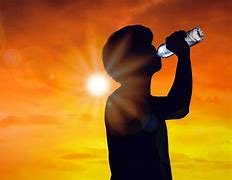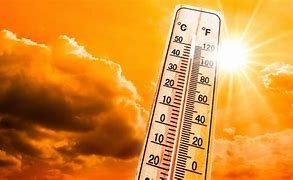At high noon in Nigeria’s capital, Abuja, the streets empty as the scorching sun turns the city into a furnace. The heat is relentless, punishing those who dare to step outside. In hospitals, emergency wards fill with dehydrated patients, while reports of sudden deaths, especially among the elderly and outdoor workers—rise with each passing season. Abuja taxi drivers seek refuge under the few trees scattered across the city, desperate for shade. To make matters worse, electricity supply in the metropolis has declined, rendering fans and air conditioners useless against the suffocating heat. The shortage of water, caused by the frequent power outages that prevent borehole-dependent residents from having steady water flow, further exacerbates the crisis.
Unfortunately, the Nigerian government has failed to find lasting solutions to this recurring public health threat, but continues as usual, to underestimate extreme heat crisis, hence, early warning messages aimed at informing the populace are completely non-existent. Gom Mirian who spoke with some experts, reports.
The Heatwave Reality: More Than Just Discomfort
Heatwaves are not just a seasonal nuisance; they pose severe health risks that can lead to dehydration, heat exhaustion, and even death. Vulnerable populations, including the elderly, infants, and those with chronic health conditions, bear the brunt of these extreme temperatures.

Sleeping at work
In an interview with Africa Health Report (AHR), a public health expert, Dr. Aminu Garba said, “Hot weather commonly causes dehydration, heat exhaustion, heat stroke, heat rash, and heat cramps. It can worsen health conditions in people who have cardiovascular and respiratory diseases.”
According to him, everyone is exposed to the risk of high temperatures, but more so with people who work outdoors and with heavy manual physical workloads.
He added that high temperature can have very deleterious effects on the human body. “Apart from causing the temperature of the body to be high, extreme heat can lead to dehydration could also cause fainting, chicken pox disease, measles, weakness of the body, dry lips, respiratory issues, and people that have underlying cardiovascular diseases can have a stroke, and other kinds of morbid conditions from the effects of heat.
“Excessive heat is worse in some age groups like children and older adults. The elderly are vulnerable, it can affect people who are of the extreme age groups, and they can get very sweaty, and it can cause respiratory infections,” he said.
In 2024, Nigeria faced a tragic surge in heat-related illnesses, with reports indicating a sharp rise in cases across various states.

Didn’t Sleep at Night due to the heat
One harrowing account comes from Kebbi, where 47-year-old Yusuf Idris, a commercial driver, collapsed from heat exposure while on duty. “He had been sweating profusely before he lost consciousness,” witnesses recounted, highlighting the dire consequences of neglecting the dangers of extreme heat.
In Yola, another heat-related tragedy struck. A grieving sister recounted the sudden loss of her brother. “He felt feverish and went to the hospital for tests. While waiting for the results, he slumped and died,” she said. “Before that, he kept saying he felt unbearably hot and wanted to cool off, but there was no water.”
Such cases are no longer isolated incidents. In just one month, at least 200 deaths were linked to extreme heat in Yola alone, according to a report by Daily Trust. Yet, despite these alarming statistics, the government continues to respond reactively rather than proactively. The absence of structured action plans and clear communication about the dangers of heatwaves leaves millions unaware of the impending threats.
In contrast, countries like the United States and France have established robust heatwave alert systems that prioritize public safety. The National Weather Service in the U.S. issues heat advisories through various channels, while France’s heatwave alert system includes SMS notifications and emergency action plans for vulnerable populations. These strategies have proven effective in saving lives, yet Nigeria remains in the dark, with millions unaware of the impending heatwaves until it is too late.
The Science Behind Nigeria’s Extreme Heat
According to NiMet’s Director of Weather Services, Prof. Vincent Weli, the worsening heat crisis is directly linked to climate change. “The rising temperatures are consistent with global warming trends,” he explains. “The regions most affected—Abuja, Lokoja, and Minna—share the same ecological zone and weather patterns. Last year was the hottest on record, and this year is on track to surpass it.”
Prof. Weli warns that unless carbon emissions are curtailed, Nigerians will experience even more brutal summers.
The Silent Toll on Pregnant Women and Unborn Children
Extreme heat doesn’t just claim lives—it also affects birth outcomes. A 2024 study published in the European Journal of Public Health found that exposure to high temperatures during pregnancy increases the risk of preterm births and stillbirths, particularly among low-income women.

Regular water intake as one of the measures to cope with extreme heat
Dr. Melanie Böckmann, the study’s lead researcher, explains: “Pregnant women’s ability to thermoregulate is compromised. When exposed to extreme heat, their risk of adverse birth outcomes rises significantly.”
Also, a climate change expert, Mr. Stanley Ijeoma said the high temperature in the country is unusual at this period of the year. He said global warming as a result of bush burning plays a major role in the extremely high temperatures witnessed in the country.
“NiMet blamed it on emissions. We know emissions are there, but it is not only emissions that are responsible for this,” he says. “There are lots of activities going on like bush burning, a lot of forest areas are being burnt, and we have not been serious about ensuring that we plant more trees and limit emission sources like the gas flaring in the Niger Delta.

“It’s the impact of the climate change that we are feeling, and of course, there will be heat rash, meningitis, and other heat-related illnesses,” he stressed, “We have not made a lot of investment in mapping urban heat islands, and this also speaks a lot to planting trees, which helps to cool down the environment and control the microclimate of wherever you are.
“Apart from the health implications, it is going to disrupt other economic activities like farming and agriculture,” he added.
Safety measures
Dr. Garba, advised that exposure to high temperatures should be reduced as much as possible by staying under shade or indoors with cooling systems like an air conditioner. “During the period of high temperatures, increased drinking of water is important. “Stay dehydrated, Drink plenty of water before you feel thirsty,” he said. “Avoid excessive alcohol, caffeine, or sugary drinks, as they can dehydrate you faster. Carry a water bottle when outdoors and take small sips throughout the day.
“Keep a small towel handy—soaking it in cool water, and placing it on your neck can provide instant relief. Keep Your Home and Body Cool Close curtains and blinds during the hottest parts of the day to block out direct sunlight. Open windows in the evening to allow cooler air to circulate, use fans or air conditioning where possible.”
He continued, “Wear light, loose-fitting clothing made of breathable fabrics like cotton, take cool showers or use a damp cloth on your skin to stay refreshed, stay Out of the sun limit outdoor activities between 11 AM and 4 PM, when the sun is at its peak and If you must go outside, wear sunscreen, stay in shaded areas, and use a hat or umbrella for protection. Reschedule workouts or strenuous activities for early morning or late evening.”
He advised Nigerians to check in on others to keep in touch with family, friends, and neighbours, especially elderly relatives or those with health conditions. “If you know someone who lives alone or struggles with the heat, offer assistance or check that they are safe. “he added.
“In terms of what we can do to reduce the impact of heatwaves, we can check the weather forecasts to know when it is really hot outside, and if an outing is not urgent, you can avoid traveling during the hot part of the day. Older people, children, and people with disease conditions like hypertension, diabetes, and other medical conditions should stay away from heat as it can worsen their conditions.”
The heat index forecast by NiMet showed that residents of Abuja, Kogi, Benue, Niger, Taraba, Zamfara, Abia, Enugu, Anambra, Edo, Delta, Rivers, Lagos, Oyo, Ogun, Osun, Ekiti, and Ondo among others, are highly likely to experience heat stroke or sunstroke.
According to NiMet, maximum temperatures have been recorded as follows: 42°C – Kebbi, Jalingo, Yola41°C – Lafia, 40°C – Minna, Makurdi. Meanwhile, some of the most affected areas—where extreme heat meets high humidity, making conditions even more uncomfortable—include: North-Central and North-West: FCT, Kogi, Benue, Niger, Taraba, Zamfara, South-East and South-South: Ebonyi, Abia, Enugu, Anambra, Edo, Delta, Rivers, and South-West: Lagos, Oyo, Ogun, Osun, Ekiti, Ondo.
On his part, Ijeoma called on the government to create awareness of the heatwave, “The government needs to create awareness about the season that we are in, especially for children because this is meningitis season. The government should use the National Orientation Agency to let people know what is happening and encourage them on what to do,” he urged.

Ijeoma, heat expert
“One of the ways of climate change adaptation is to know if we have the map that shows that we will be having urban heat islands. So, if we have more people and fewer trees, we are going to be having this kind of extreme weather. You can imagine an average man who does not have a means of transportation or who needs to commute from one place to another, and he has to trek but if we have trees, that would have provided some succour for him. If we have temperatures beyond what we are used to, then it is going to disrupt our health and livelihoods,” he said.
A Call to Action
As Nigerians brace themselves for another brutal heatwave, the urgency for action cannot be overstated. The government has the tools to issue heat alerts, educate citizens, and enforce climate-conscious policies, yet it lacks the urgency to act. Until meaningful interventions are implemented, the sun will remain an unforgiving killer, striking down the most vulnerable with silent, merciless force.
The question remains: will Nigeria learn from the experiences of other nations and implement life-saving measures, or will it allow extreme heat to continue claiming lives in preventable tragedies? The time for action is now, and the lives of countless Nigerians depend on it.



